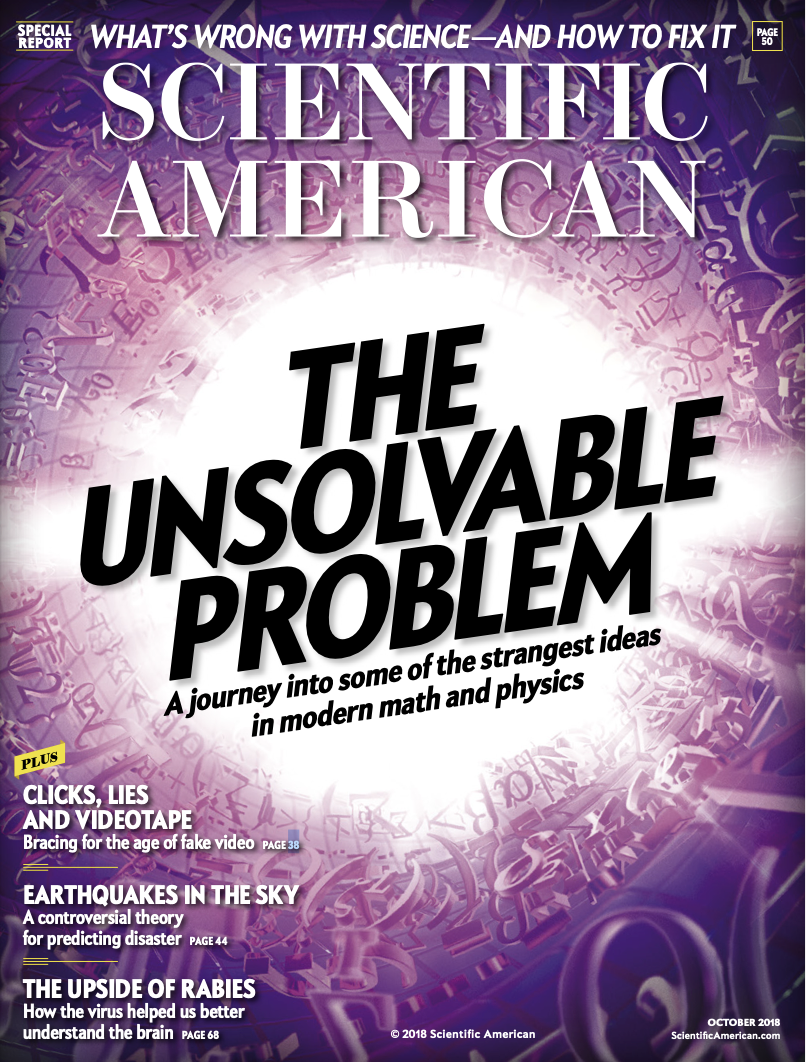|
Derek Muller (@Veritasium) has produced yet again another tour-de-force video. It is breathtaking in how well explained it is. You can find it here: https://www.youtube.com/watch?v=HeQX2HjkcNo It's titled "This is mathematic's fatal flaw" (Hint: it's not). I love almost all of Derek's stuff. A notable exception is this: https://www.youtube.com/watch?v=kTXTPe3wahc . Even the title of "Parallel Worlds Probably Exist: here's why" makes me grimace. (The reason is: they exist. There's no "probably" about it. But Derek sort of leans Bayesian a lot. And they aren't, strictly, “parallel". If you wonder why this should make one wince in a little intellectual agony, consider if a similar headline read “The spherical Earth probably exists. Here’s why.” All that aside, if you want to learn more about all that see my multiverse series here: https://www.youtube.com/watch?v=e6C_K18A4f8&list=PLsE51P_yPQCQqJDb65AIVLads8PKxYuPm But I forgive him. He's an Aussie and I think the very best physics populariser and educator alive today. So this “breathtakingly” wonderful video of Derek’s is all about Godel’s incompleteness theorem and Turing machines and related matters. But at 34 minutes - it is long. (I’m one to talk. My own video on a similar topic arising from the work of David Deutsch in “The Beginning of Infinity” runs to 1 hour and 12 minutes: https://www.youtube.com/watch?v=aMtort-zvdI ). I mention that because it places me in a position of some experience: people rarely watch the whole video! So for those who don’t here is my 3 minute explanation of a really cool result I never quite understood before. At the 28 minute mark, Derek refers to an extremely long journal article published in Nature called “Undecidability of the Spectral Gap” - it can be downloaded in full here https://www.nature.com/articles/nature16059 or in the ArXiv here: https://arxiv.org/pdf/1502.04573.pdf for free. It’s 126 pages including a lot of dense mathematical argument. Anyways what drew my attention was that Derek flashed up on the screen a quote “from the authors” which said “Even a perfect complete description of the microscopic interactions between a material’s particles is not always enough to deduce its macroscopic properties”. Now this is an astonishing conclusion to draw from a mathematical proof. Here they are saying that reductionism - the claim that a “complete description” (description mind you, not explanation) cannot always be derived of a system given the behaviour of particles at the microscopic level. I already knew reductionism was false. It’s a bad explanation (and more besides). But here, apparently, is a mathematical proof. I went to the paper, however, and that quote is not there. To be fair he never said it would be. So I googled. It required me to purchase a copy of “The Scientific American” (this one) before I found the quote on page 37. So, to be fair, the quote is not part of the proof but rather a comment on the proof by one of the authors. But that's ok. (A little more below the image...) So to be fair this is a comment by one of the authors on the proof rather than a part of the proof itself. Nevertheless, this is an amazing result.
The next time someone wants to argue that determinism rules out higher level causation or emergent causation or top down causation or anything else like that not only is their appeal to reductionism a bad explanation. It also happens to be provably untrue given quantum mechanics. Neat.
2 Comments
Mikey
11/1/2021 01:15:24 pm
Thank you! I've been scouring the internet for a source on this quote!
Reply
Jesse M.
6/6/2024 01:46:51 pm
Even in a simple simulated cellular automaton like Conway's game of life, there can be patterns that function as Turing machines so that questions about whether the Turing machine ever halts can be made equivalent to questions about whether a certain pattern ever occurs in the infinite future of that simulated world. But I would not say this really conflicts with the idea that "reductionism" is true for that world, since for any *finite* time interval, we can always calculate the state at the end of that time interval based on the state at the beginning plus the simple low-level laws that governing how the cells evolve on each time-increment. So, is this paper showing like this, or is it actually claiming we can't predict the system's state at the end of a finite time interval? I suspect it's talking about what state the system will settle into after a potentially arbitrarily long period, since the paper refers to what's true about the "thermodynamic limit".
Reply
Leave a Reply. |
Archives
December 2023
CriticismThe most valuable thing you can offer to an idea Categories |

 RSS Feed
RSS Feed